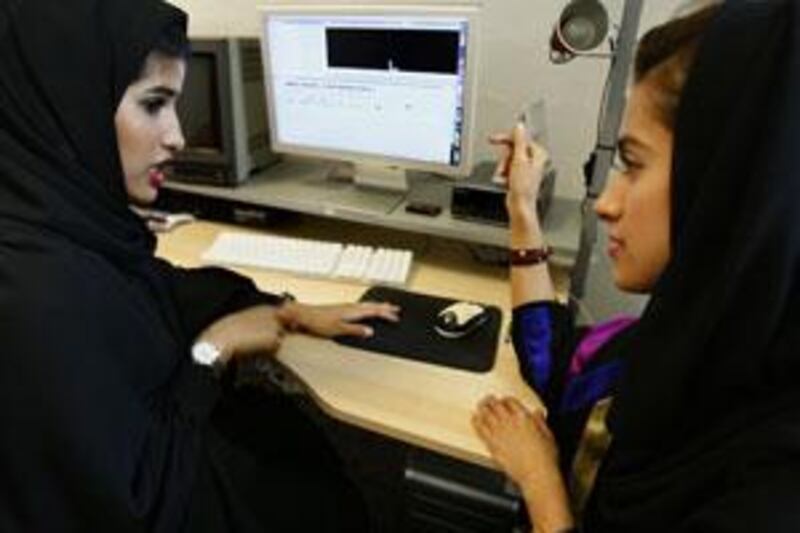DUBAI // Emiratis disrespecting their own culture. Emirati women accused of vanity. Emirati men obsessed with their cars. Not long ago, openly expressing such views was unthinkable. While the mainstream media continues to shy away from tackling such taboo subjects, a group of local female filmmakers, who showcased their short documentaries at the Gulf Film Festival last week, have no such qualms.
Ana Arabi (Am Arabi), a 21-minute lament against the dilution of the Arabic language and culture by foreign influences, was co-directed by Ahlam Albannai, 22, and Jumana al Ghanem, 21, both students at Dubai Women's College (DWC). "It is a trend that is more prevalent with Emirati men, as if not speaking perfect English these days marks you out as uneducated," Ms Albannai said. Ms Albannai admitted that she, too, falls into this trap.
"My close friends and I realised that we do this too, mixing our Arabic and English, and we have to start highlighting to future generations that this shows a complete disrespect to our very rich heritage," she said. Television and the media receive much of the blame, but so do the UAE's higher educational institutions. "When you're in government schools you only get one English language class, but that's reversed when you get to college with all subjects being taught in English, and only one very weak Arabic language class," Ms Albannai said.
Parents, too, do not escape scrutiny, as more and more children are left in the care of foreign housemaids and nannies for hours every day, as some of the scenes in the documentary showed. Ms Albannai said: "Many parents intentionally avoid hiring maids who speak Arabic as they'd prefer their children to converse in English, and the child ends up speaking a hybrid of the two languages." There are mitigating reasons, the film points out, with foreigners making up 87 per cent of the population of the UAE, a far higher rate than other GCC countries.
As one of the film's subjects said: "You can't function in Dubai if you don't speak English." Ms Albannai accepted that Arabic culture should take some of the blame, considering the dearth of truly inspiring books, films and TV programmes. "Absolutely, not enough good material is on offer and we have only ourselves to blame in that we have voluntarily swopped our culture for theirs," she said. The film's message is that mixing Arabic and English shows weakness and a lack of pride in Emirati culture.
Weakness of character is one of the themes in E'aadat Tashkeel (Reconstruction), a documentary that highlights the growing trend of plastic surgery among Emiratis. Directed by Aisha al Suwaidi, a 24-year-old student at DWC, the 17-minute film took two months to complete and faced major obstacles from the beginning, not least in persuading people to speak about their cases on camera. One surprising statistic is that 46 per cent of Emiratis undergoing plastic surgery were men. Not so surprising, however, is that not a single man agreed to being interviewed for the project.
"All the men we approached refused to be interviewed. The women were far braver than the men," said Ms al Suwaidi. Some of the older voices in the documentary showed their displeasure at this phenomenon, considering it un-Islamic, and, almost without exception, the women faced objections from their parents. The film suggests that whether surgery was out of necessity or vanity, most female patients are likely to suffer from insecurities and increasingly resort to it in a desperate effort to find a husband.
Moza al Sharif, another DWC student, is responsible for Al Zawja Al Thania (Second Wife), a look at Emirati men's obsession with their cars. The 14-minute documentary is a series of comments from young Emirati men and women, where the humorous tone does not mask the seriousness of the message. Women claim men are willing to spend more money on their cars than getting married. "They're willing to take out massive loans and spend up to Dh400,000 on a car but that leaves them penniless when they get married," a woman said.
"The car never says no to me and doesn't answer back," a young man responded. One thing uniting these students is the desire to continue making films after graduation. None of the films in the student competition had any funding or sponsorship, but that has not put off the young directors from pursuing a career in the industry. Ms al Suwaidi said: "A journalist suggested that all our work was pointless as we'll get married and become housewives after graduation, but I said I didn't study for four years so I can sit at home afterwards.
"We are determined to prove the exact opposite." @Email:akhaled@thenational.ae






